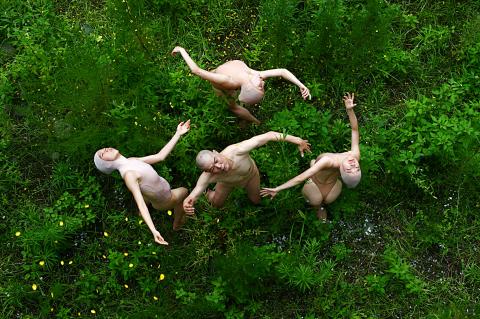Taipei Dance Circle (光環舞集舞蹈團) returned to the Experimental Theater in Taipei last night with founder Liou Shaw-lu’s (劉紹爐) latest creation, Chasing the Wind Turning (逐風轉).
Liou and his wife, Yang Wan-jung (楊宛蓉) founded the company 29 years ago as a “traditional” modern dance company. However, since 1994 and Liou’s Olympics (奧林匹克), the troupe has become renowned for its well-oiled works. Baby-oiled that is. The oil allows for frictionless movement, making the dancers look like they are gliding on top of a river.
That is especially relevant to the new production, which, as with several of Liou’s recent works, was inspired by a body of water.

Photo Courtesy of Taipei Dance Circle
“I am emotionally moved by the long and flowing river. It makes me feel the wonder of the universe, pulling me into a deep and intimate world of love,” he said.
The piece reflects the growing spirituality of his works and an emphasis on connecting with the environment around us.
He is also interested in the theme of overcoming physical or mental hurdles. This focus on mastering challenges has been especially apparent after Liou himself faced the challenge of recovering from brain surgery in early 2010.
His dancers frequently have to struggle to achieve their goal; the oiled sheet they dance on is great for sliding and spinning, not so great for simple walking or balancing movements. His work may be frictionless, but it is not effortless.
For Chasing the Turning Wind, Liou was inspired by the work of the Six Dynasties-era “hermit” poet Tao Yuan-ming (陶淵明).
His program notes cite one poem in particular: “Life has neither root nor stalk. Like dust in the air, life takes off, chasing the wind in changing directions. It touches ground to undergo bonding and brotherhood for reasons other than blood link.”
The new production, set on four dancers — Liou and three women — is divided into nine segments, beginning with Prelude With the Nautilus.
The piece is set to an eclectic selection of music by Sydney-based composer Colin Offord, Ho Xun-tian (何訓田) and Hsu Sung-ren (徐頌仁).
After this weekend, the company will perform Chasing the Turning Wind one more time, in Chiayi on Nov. 16.

Climate change, political headwinds and diverging market dynamics around the world have pushed coffee prices to fresh records, jacking up the cost of your everyday brew or a barista’s signature macchiato. While the current hot streak may calm down in the coming months, experts and industry insiders expect volatility will remain the watchword, giving little visibility for producers — two-thirds of whom farm parcels of less than one hectare. METEORIC RISE The price of arabica beans listed in New York surged by 90 percent last year, smashing on Dec. 10 a record dating from 1977 — US$3.48 per pound. Robusta prices have

The resignation of Taiwan People’s Party (TPP) co-founder Ko Wen-je (柯文哲) as party chair on Jan. 1 has led to an interesting battle between two leading party figures, Huang Kuo-chang (黃國昌) and Tsai Pi-ru (蔡壁如). For years the party has been a one-man show, but with Ko being held incommunicado while on trial for corruption, the new chair’s leadership could be make or break for the young party. Not only are the two very different in style, their backgrounds are very different. Tsai is a co-founder of the TPP and has been with Ko from the very beginning. Huang has

A few years ago, getting a visa to visit China was a “ball ache,” says Kate Murray. The Australian was going for a four-day trade show, but the visa required a formal invitation from the organizers and what felt like “a thousand forms.” “They wanted so many details about your life and personal life,” she tells the Guardian. “The paperwork was bonkers.” But were she to go back again now, Murray could just jump on the plane. Australians are among citizens of almost 40 countries for which China now waives visas for business, tourism or family visits for up to four weeks. It’s

A dozen excited 10-year-olds are bouncing in their chairs. The small classroom’s walls are lined with racks of wetsuits and water equipment, and decorated with posters of turtles. But the students’ eyes are trained on their teacher, Tseng Ching-ming, describing the currents and sea conditions at nearby Banana Bay, where they’ll soon be going. “Today you have one mission: to take off your equipment and float in the water,” he says. Some of the kids grin, nervously. They don’t know it, but the students from Kenting-Eluan elementary school on Taiwan’s southernmost point, are rare among their peers and predecessors. Despite most of